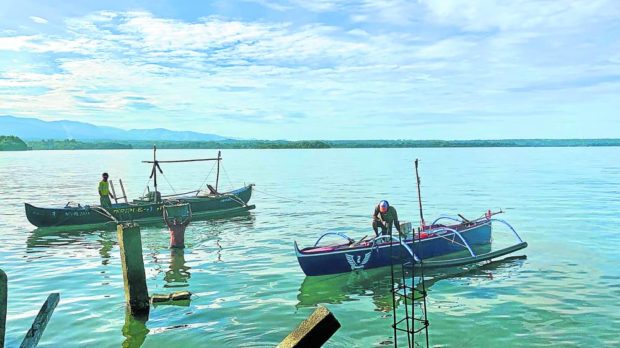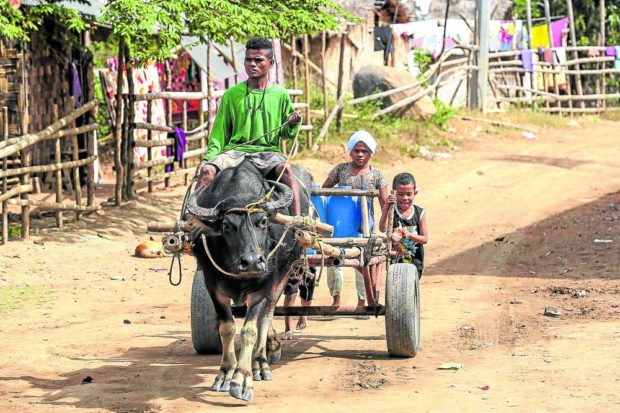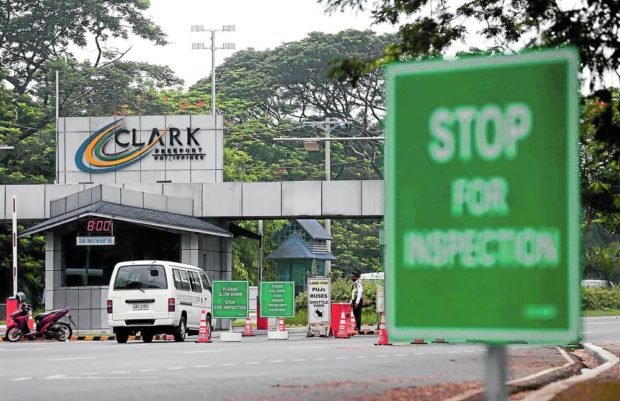From farming to fishing: Central Luzon groups push for reforms

EARLY MORNING TOIL | Fishermen in Masinloc town, Zambales province, prepare their boats early in the morning, hoping to catch enough fish and other seafood. Communities in Zambales and Bataan dependent on the bounty of the West Philippine Sea will be among those who will benefit if candidates make true on their promise to protect the country’s territorial waters. (Photo by JOANNA ROSE AGLIBOT / Inquirer Central Luzon)
(Second of a series)
Situated between Metro Manila and Northern Luzon, Central Luzon is blessed with verdant farmlands and natural harbors. It is composed of seven provinces, 12 cities, and 118 municipalities.
From the tip of the Bataan peninsula to the west, and the rolling Caraballo Mountains to the east, it is the longest contiguous area of lowlands, and is known as the “Central Plains” of Luzon. The region produces a third of the country’s total rice production.
Occupying the biggest land area in Central Luzon and dubbed the “rice granary” of the country, the province of Nueva Ecija is host to 196,390 hectares of farmland dedicated to crops like rice, onion, and garlic.
But just like the farmers in Northern Luzon, those in Nueva Ecija are hoping that the next administration will work to end smuggling and importation of agricultural products as they appeal for more support from the government to cut the production costs.
“What’s in store for us, farmers, if they get elected?” asked Mario de la Cruz, a farmer leader and chair of a dairy cooperative in Bongabon town.
Dela Cruz said the surging prices of farm inputs, particularly fertilizers, soared from P900 to P2,500 in just a few years, while the prices of palay (unhusked rice) dropped to an average of P14 a kilo last harvest season.
Territorial rights
Bishop Sofronio Bancud of the Diocese of Cabanatuan also expressed dismay over the unabated smuggling of agricultural products, which he said was the handiwork of unscrupulous people.
In the Catholic-run Radio Veritas, the prelate was recently quoted as saying: “Once for all, let’s hold accountable those who are involved in smuggling, as well as in the many other crimes that are perpetuated by those in power.”
He particularly called on party-list groups, which supposedly represent farmers, fisherfolk and other marginalized sectors, to hear and act on the needs of their constituencies.
In Zambales province, where the majority of its 515,724 registered voters rely heavily on fishing, agriculture and tourism, residents said candidates must present platforms that would protect biodiversity and safeguard national sovereignty.
Bobby Roldan, a fisherman from Masinloc town and vice chair of fisherfolk group Pamalakaya in Luzon, said they would support local candidates who would vow to assert territorial and sovereign rights over the disputed areas in the West Philippine Sea.
Roldan said candidates in Central Luzon should “present categorical platforms in support of the Filipino fishers who are adversely affected by the Chinese aggression in the West Philippine Sea.”
“This is the most opportune period for our sector to challenge candidates to stand in favor of our collective aspiration to wrest back control of our territorial seas,” he said.
Zambales fishermen have long been sailing to Scarborough Shoal, locally known as Panatag or Bajo de Masinloc, as it serves as their traditional fishing ground. The shoal is situated inside the country’s 370-kilometer exclusive economic zone.
Some fishermen in this province have stopped fishing at the shoal since they experienced harassment from the Chinese Coast Guard and due to the depletion of marine resources there.
China, which has sweeping claims in nearly all of the West Philippine Sea, seized control of the shoal in 2012, prompting the country to seek United Nations’ arbitration. In 2016, the UN arbitral tribunal invalidated China’s sweeping claims, but China continues to ignore the ruling.

NUKE POWER Several groups in Bataan have reminded candidates to stop the proposed revival of the Bataan Nuclear Power Plant. —REM ZAMORA
Nuke plant
In Bataan, a peninsula with 566,479 registered voters, several groups are still waging a campaign against nuclear power as a source of energy despite the pronouncement of the provincial government that it would oppose the reopening of the Bataan Nuclear Power Plant (BNPP).
Edlyn Rosales, 41, a mother of two and a leader of the fisherfolk group Pangisda Bataan, said rehabilitating the BNPP would not contribute to real industrialization.
“We should fight against nuclear power not only in Bataan but also in other parts of the country. In this kind of project, only the capitalist will gain financially to the detriment of the environment,” Rosales said.
Francisco Honra, secretary general of Nuclear-Free Bataan Movement, said residents should realize the danger that operating the BNPP poses.
And although Bataan is a picture of progress and prosperity, much is still to be desired in terms of environmental care following the reported denudation of forest and illegal cutting of trees.
Balanga Bishop Ruperto Santos said candidates must also focus their platforms on illegal drugs, online gambling and illegal logging.
“Bataan is blessed with land, [sea] and rivers. With these, we have rice, seafood and rootcrops. So we have to be thankful to God,” Santos said.

IP RIGHTS Protecting the rights of indigenous peoples (IP), like this Aeta family in Porac, Pampanga, in this 2018 photo, is one of the election issues in Central Luzon. —INQUIRER PHOTO
Pandemic recovery
In Pampanga, candidates seeking local elective positions should present programs on how the province and its 2.437 million people (as of 2020 Census) could recover from the health and economic impacts of the pandemic.
Jesus Nicdao, president of the Pampanga Chamber of Commerce and Industry (PamCham), said the province’s recovery would depend on the rehabilitation of the hardest-hit sector—the micro, small and medium enterprises, specifically the microbusinesses that were forced to shut down during the pandemic.
In a statement, Nicdao said PamCham agreed to partner with the provincial government on “assistance programs that will restore, reintegrate and readapt the microbusinesses to the new normal way of doing business.”
Rene Romero, private sector representative in the Regional Development Council, said winning candidates should monitor the infrastructure projects started under the “Build, Build, Build” program and regular programs of the Department of Public Works and Highways.
Local officials should help members of the indigenous clans of Aeta lobby with the National Commission on Indigenous Peoples to get their certificates of ancestral domain title (CADT) and have a representative in legislative councils, according to Ric Guiao, a tribal leader in Porac town.
Gelacio Angeles, a farmer from Bacolor town, said candidates should address issues of e-sabong operation, delay in the release of subsidy to farmers and fisherfolk on the heels of fuel price hikes, and smuggling of agricultural products.
Jobs, infra projects
In Bulacan, businessmen are expecting candidates to sustain infrastructure progress in the province, which will host the P735-billion “airport city” that is expected to generate jobs for residents.
Victor Mendoza, head of the Bulacan Chamber of Commerce and Industry, said local officials must prepare residents by developing skills and competencies for job opportunities that would be available as a result of these projects.
“The capabilities of people in handling different businesses and tourism facilities must be upgraded to match these macro developments. Foreign tourists are expected to come to the province because of the international project,” Mendoza said.
But he said measures to protect the environment must also be put in place to ensure sustainability while local tourism in Bulacan is thriving.
In Aurora province, access to medical facilities remains one of the main concerns among its residents. When Aurora experienced a surge of COVID-19 cases in September 2021, all hospital beds and quarantine and isolation facilities in the province were full and could no longer accommodate other patients who tested positive for the viral disease.
The province had only 311 active COVID-19 cases at that time, which was significantly fewer than active cases in other Central Luzon provinces.
There are only four hospitals in Aurora, all government-owned, located in the capital Baler and the towns of Casiguran, Maria Aurora and Dingalan. The most accessible private hospital is located in San Jose City in Nueva Ecija.

EMPLOYMENT OPPORTUNITIES The Clark Freeport in Pampanga province is among the top job generators in Central Luzon. In this year’s elections, employment opportunities and just wages will be among the top issues that candidates will need to address. —NIÑO JESUS ORBETA
IP rights
Ancestral domain rights of indigenous peoples (IP) of Tarlac province remains one of the unsolved concerns among the thousands of Aeta.
In 2018, the Bases Conversion and Development Authority started developing the 9,450-ha New Clark City in Capas, Tarlac, which straddles the ancestral domain of Aeta.
Since the construction of buildings and facilities started there, including the sports complex used for the 2019 Southeast Asian Games, Aeta families who had been living in the area all their lives have been displaced.
While the Aeta’s right to live undisturbed in the hills and mountains covered by their CADT is protected by Republic Act No. 8371 (Indigenous Peoples’ Rights Act of 1997), the development of New Clark City is pursuant to Republic Act No. 7227, or the Bases Conversion and Development Act of 1992.
—REPORTS FROM ARMAND GALANG, JOANNA ROSE AGLIBOT, GREG REFRACCION, TONETTE OREJAS, CARMELA REYES-ESTROPE AND JUN MALIG
RELATED STORIES
Over 6,000 Central Luzon workers get P147M in claims-DOLE
Over 26,000 farmers in Central Luzon given land titles – DENR
Imports’ continuing impact on PH farmers: Like dislocating the kneecaps